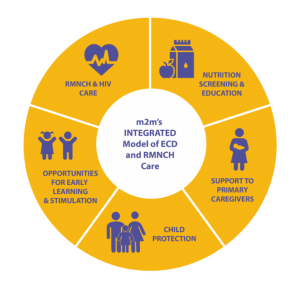G20 Commits to Early Childhood Development
By Fiona Burtt, Senior Technical Advisor, ECD/OVC at mothers2mothers
2018 has been a landmark year for early childhood development (ECD). In May, the world’s first framework for global ECD action and results, the Nurturing Care Framework for Early Childhood Development, was launched by the World Health Organization, UNICEF, the World Bank, and the Partnership for Maternal, Newborn & Child Health, at the World Health Assembly in Geneva. And last weekend, at the G20 summit in Argentina, twenty of the worlds’ leading economies agreed to a major new commitment to prioritising ECD, particularly in lower and middle income countries. The G20 Declaration states:
We launch the G20 Initiative for Early Childhood Development and stand ready to join all stakeholders in enhancing quality and sustainably financed early childhood programs that consider the multidimensional approach of ECD, as means of building human capital to break the cycle of intergenerational and structural poverty, and of reducing inequalities, specially where young children are most vulnerable.
The G20 Initiative emphasises the fundamental importance of focusing on and supporting the earliest years of a child’s life, the role of parents, caregivers and families, play, early stimulation, responsive care, health and nutrition, and the need for stronger financing streams and multi-sectoral collaboration. At m2m, we recognise the significance of such collaboration and make particular efforts to collaborate with and support governments, fellow NGOs, local communities, and many other stakeholders.
As integrating ECD into m2m programming for the most vulnerable children and mothers becomes ever more important, we have sought to play a leading role in national and regional ECD networks in sub-Saharan Africa. In Eswatini (formerly Swaziland), we were co-founders of the national ECD Network and, this year, m2m joined the continent-wide African ECD Network. In Zambia, we are a member of the Zambia ECD Action Network, the local branch of the global ECD Action Network (ECDAN), a network of international donors, multilateral development agencies, Civil Society Organisations, international NGOs, the private sector, ECD regional networks, academia and think tanks, which led the advocacy process to help make the G20 ECD Initiative happen.
The G20 ECD Initiative is another critical milestone on the road to achieving scaled up support for the youngest and most vulnerable children, their rights and needs, and to accelerating progress towards achieving the Sustainable Development Goal targets for young children. In a most timely fashion, this, and the launch of the Nurturing Care Framework, coincided with the 2018 expansion of m2m’s integrated model of ECD and reproductive, maternal, newborn and child health (RMNCH) to Malawi and Kenya. In Nairobi and in Mulanje District in Malawi (the district with the highest HIV burden in the country), ECD is now an integral component of our programme. More than 45 Mentor Mothers have been trained to support mothers and families with essential education about early stimulation, responsive and positive caregiving and developmental milestones, in addition to RMNCH services.

We are heartened by the recognition that our model aligns firmly with the key elements of both the Nurturing Care Framework and the G20 Initiative, not least the emphasis on supporting the period from conception to the first three years of life, as a critical period of development, when we want to see children in Africa not only surviving HIV and other major challenges, but thriving.
As the G20 Initiative declaration states:
We recognise that investment in Early Childhood Development (ECD), without any discrimination, should be a high priority as it gives all children the opportunity to achieve the full realization of their rights and capabilities. A focus on ECD brings clear benefits both to the individual and society, reducing health and economic problems that children can carry throughout their entire lives. It paves the way for intervening at the most critical stage of human development in order to break the vicious cycle of intergenerational and structural poverty, societal disparities and inequality of opportunities, ensuring that no child, anywhere, is left behind.
2018 has been an exciting ECD year for not only the world, but m2m. With the prospect of scaling our ECD work to more countries in 2019, thanks to our generous donors and supporters, we look forward to continuing to play our part in elevating and enhancing ECD opportunities for HIV-exposed and other vulnerable children, their families and communities across Africa!






















